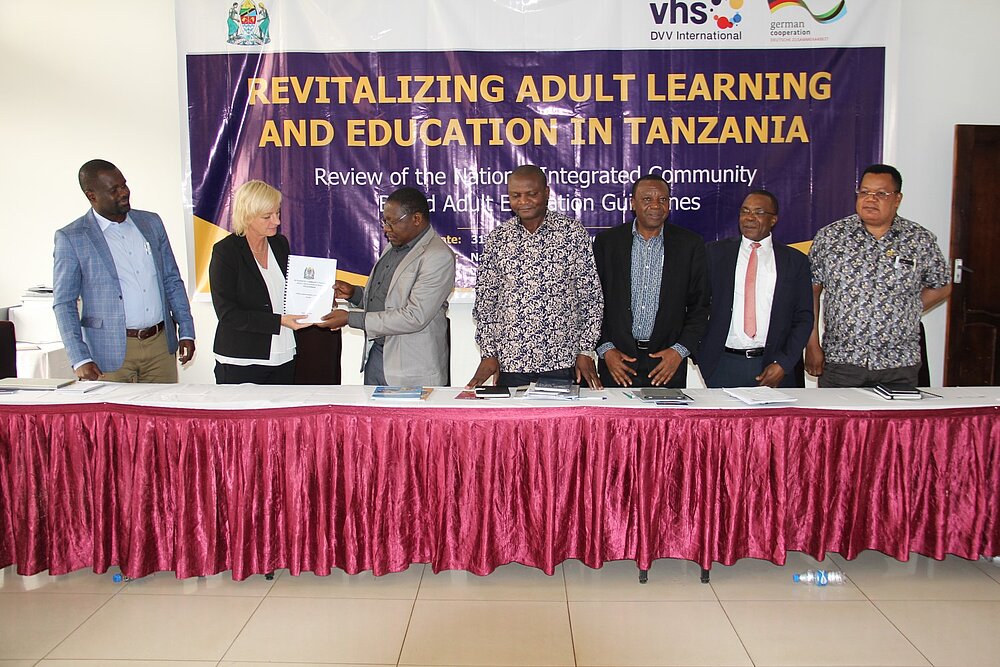DVV International started operations in Tanzania in 2021. Following consensus-building processes with the relevant ministries and key stakeholders in the field of Adult Learning and Education (ALE), DVV International is now implementing evidence-based policy and programme advice for the responsible Ministries, in addition to targeted capacity development measures for ALE practitioners and managers, and the piloting of Community Learning Centres (CLCs) for the provision of ALE services.
In this context, the Ministry of Education, Science and Technology (MoEST) and DVV International are currently reviewing the national Integrated Community Based Adult Education Programme (ICBAE) to respond more efficiently to the socio-economic situation of youth and adults in the country.
The ICBAE programme is a non-formal ALE-programme which was developed in 1993. After piloting, it was implemented by the Ministry of Education since 1997 to ensure that every out-of-school youth and adult has access to basic education and skills development through functional literacy.
The programme is based on the REFLECT methodology, a participatory method in which groups of adult learners come together to learn literacy and numeracy, while analysing different aspects of their own lives. This method can help the increasing number of young people and adults with limited basic education and limited income-oriented skills to access education through the non-formal pathway.
Adult education has fallen out of focus in Tanzania
Over the past two decades however, adult education has fallen out of focus in Tanzania and challenges, such as underfunding of the sector, staff shortages at district level and low consideration of adult education in the national reporting and monitoring system, have hampered the successful implementation of the programme. In addition, the content of the existing learning components formulated in the first edition of the ICBAE programme in 1993 has never been reviewed and adapted to the current socio-economic development of the country and the current specific needs of the learners.
That the programme continues to be relevant is shown by the increasing illiteracy numbers in Tanzania. Despite the success recorded on literacy rates of 98% in 1980s, there are increasing pockets of illiteracy reported in Tanzania today. In 2015, there were only 77.9% literate adults. The results of the 2022 census show even higher rates of illiteracy of above 25%. In addition, the increasing trend in population growth has an impact on both the formal and non-formal education system, which needs to accommodate more young and adult learners, and ultimately these people need to find livelihood opportunities.
Comprehensive review process to update and improve the existing ICBAE programme
To address these challenges, DVV International facilitated the establishment and work of a national Technical Working Group in 2023, comprised of representatives of the MoEST and the President’s Office for Regional Administration and Local Government (PO-RALG) from the national, regional and district level, the Tanzanian Institute of Adult Education and the civil society education network TENMET, as well as the University of Dar es Salaam. Under the technical guidance of DVV International and in close cooperation with the Institute for Adult Education, this group leads the comprehensive review process to update and improve the existing ICBAE programme guidelines and handbooks for facilitators on the extended learning components.
The review is based on research which has been conducted by DVV International in cooperation with the University of Dar es Salaam and the Institute of Adult Education in 2022/23. Three essential studies must be mentioned here: An assessment of the socio-economic situation and development in Tanzania, a learning needs assessment in four pilot districts and an evaluation of the status and challenges in the implementation of the ICBAE programme. The results of these studies have been massively funnelled into the design of the reviewed programme guidelines and new competence-based learning components.
The revised programme aims to provide youth and adults who have not been able to finish school – or have completed it but have not received adequate education – access to basic education and opportunities for skills development based on current needs in the communities and labour market.
Competency-based curriculum
The five competence-based learning components of the revised ICBAE programme are comprised of the following:
- Pre-vocational skills in 16 differentiated income-generating areas
- Entrepreneurship and business skills
- Agriculture and livestock
- Health and hygiene
- Civic education and life skills
In addition to the above, the ICBAE programme is now rooted in a competency-based curriculum; it is learner-centred and demand-driven, fosters critical thinking and problem-solving skills, and integrates topics on gender equity, inclusion, environmental awareness, and digitalisation.
After further consultation processes and the graphic revision of the facilitators’ guidelines, the revised ICBAE programme is planned to be launched in the first quarter of 2024.




